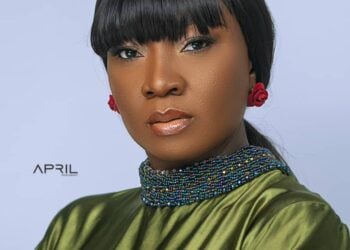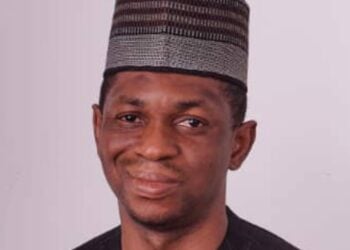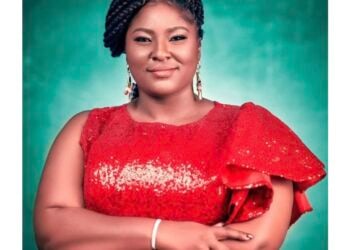Recently, Haitian-American actor and producer, Jimmy Jean Louis, was in Lagos, Nigeria, to attend the 12th edition of the Africa International Film Festival (AFRIFF) held from November 5 -11, 2023. He won the Africa Movie Academy Award for Best Actor in a Supporting Role for his performance in the movie, Rise, one of the films screened at this year’s AFRIFF.
Jimmy Jean-Louis was born in Haiti and spent his formative years in Paris where he developed his skill and talent in acting, modeling, and theatre. He moved to America in the 1990s, starring in small roles and breaking into mainstream American TV (Heroes) and movies (Phat Girlz).
He is a story of resilience as he was homeless for a period. This reality has shaped his philosophy as to how he navigates life and the acting roles he takes.
“I look at the merit of the movie that is to be shot and what message it can put out, rather than focusing on the budget.
“I adjust to the reality of the production if I see the value in why this particular story has to be told. I have had low and high points in my life and I allow that to guide my decisions,” he says.
Jimmy Jean-Louis has kept true to his African roots as he frequently visits the continent, particularly Nigeria.
He says, “I think my grandparents were actually from here, so there is a natural connection that’s here.”
He started his relationship with Nigeria in 2006 and has since gone on to co-produce and co-direct a Netflix original documentary, Jimmy Goes to Nollywood, in which he takes a closer look at the Nollywood film industry through the eyes of various actors and actresses in Nigeria and Ghana.
His involvement with the African movie/cinema space is a testament to his dedication to his roots. Solidifying his Nigerian romance, he has been involved in collaborations with Kunle Afolayan (The CEO, Citation), with another film in the works.
Comfort Booth, of Real Housewives of Abuja and contributing writer for LeVogue magazine, caught up with Jimmy Jean Louis in-between his schedule at the futuristic and artsy hotel aptly named The Art Hotel, Victoria Island, Lagos, to hear his perspectives on the African film industry, African cinema representation, what AFRIFF is doing to bridge the gap in the industry, its intersection with Hollywood and what next for Jimmy Jean Louis.
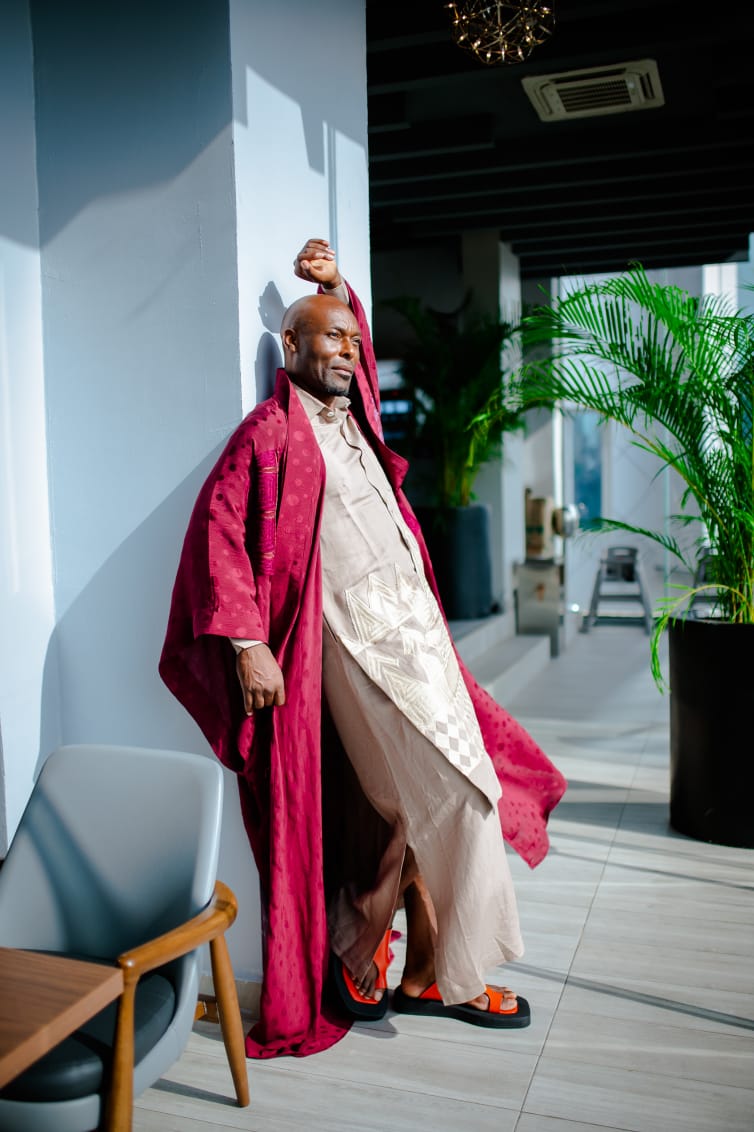
Congratulations on your recent Africa Movies Academy Awards win for Best Male in a Supporting Role. How does this recognition impact your perception of the African film industry, and what message would you like to share with emerging African actors and filmmakers?
Yes, I’m very happy to be recognised for the work that I did in the movie, Rise. It is a movie that dealt with the girls that were kidnapped by Boko Haram. And as you know, back in the United States, a lot of noise was made about it because the first lady, Michelle Obama, came up with the hashtag #bringbackourgirls.
So, I’m happy to have been recognised for that role. It’s not the first time that I’m getting recognition from AMAA. I should say I’m an oldie; I’ve been going there for the past 15 years and have had many awards, as a producer and as an actor.
How was the experience hosting the AMAA in 2012?
I enjoyed hosting the AMAA in 2012. I love to support such events and I’m proud to participate in award shows and all the black festivals, especially the ones that are happening on the African continent. This industry represents us in all forms, which is why I always support such events. So yes, for me, it’s a big win.
What message would you give to aspiring African actors and filmmakers?
Well, first of all, I would like them to know that everything is possible. I say this because this was my case and many people don’t realise that. I’m one of those kids who grew up in a shack, without electricity or running water, and that was my situation at the beginning of my life, just to tell you the journey from the beginning of where I came from to what it is now. I mean, anything is possible for whoever. However, we also need to be realistic with our goals and make sure that we have proper training for everything we do. If you want to be an actor, make sure that you think of an acting school, acting classes, or theatre classes because it’s a job and you need to master the craft before you can even entertain working.
If you do this, then you’ll find yourself in a space with professional people, and that’s how you can create your network, and start working. But we are living in a society where this generation believes in overnight success and I wouldn’t encourage that. Another thing, don’t try to be a star. Don’t do just about anything because you want to be a star. Become good at what you do and it will take you to the next level, grow organically and you will become recognised for your work, but the goal should never be wanting to be a star.
What are your goals?
I’m not quite sure how to answer that. I just follow my heart and I think about what works for me. If it takes me to the next level, then I continue. I always aim higher, but I don’t have an ultimate goal because having a goal sometimes can restrict me.
This is the first time I’m hearing someone say I’m going to be fluid on how I want to cultivate and attain my goals.
Yes.
And you will attain “my goals” eventually?
It is my philosophy that if I set any kind of limits, and I get to it, then what happens? So I don’t really set anything. I have an idea of what route I want to take and what things please me. But, you know, I don’t really make anything a hard goal because sometimes one street can take you to places you don’t expect.
Now, are you going to be curious enough to take that street or not? In my case I’m curious, I take that street and see where it leads me. Even if it leads me to where I don’t expect, I hardly go back. I will find a way; there’s always a way. There’s always a message in anything that happens to you even in the worst situation. Find that message. Understand it and keep moving.
Your career has included a diverse range of roles in Hollywood and African cinema. What draws you to particular projects or roles? For example, in Everything But A Man, it was a controversial role where you were between two women. Then in Citation, you were the villain, so how are you able to switch so seamlessly between roles?
First of all, I don’t look at roles as good or bad; I just look at the depth of the role, and what kind of message that role can give. You know, whether the characters appear good or bad, at the end of the day, whatever we do, we have a motivation for it and convince ourselves that what we do is good.
So, now I don’t mind playing any kind of character at all. What I like about all those different kinds of movies is where they take me as a person – the journey in which they take me, because now, for example, when playing the professor in CITATION, you know, it took me to that space of that guy who would actually think, plan, and then execute what he did.
And for two months, my mind was there and I studied to understand his thought processes and everything. So, in that case, there might have not been a great message behind it, but the experience is still good and people can learn from it. It’s not just that character, but a lot of us are at fault, the same behaviour you find in every single social class of society, in government, in schools, in churches, and at home.
So, the thought process here, is exploitation and power?
Yes. So, the thought process is, “I have the power so I can do whatever I want to do with you.” You find that pretty much everywhere in society. So now you have to think of it in a broader sense when you are watching these films and the lessons we can learn from them.
How do you navigate the challenges and experiences of working in these different film landscapes? One minute you are in Hollywood and then you are in Nollywood.
Luckily, I was able to establish myself in the hardest industry in the world, Hollywood. So, for me after doing that, it made sense to reach out to places where I had lived – France, Spain, Africa, Italy, and South Africa, and that’s how I was able to plant seeds in those markets after I got a little bit of success in Hollywood and then making sure I’m not going to depend on that Hollywood machine. And also, that included Africa and the Caribbean. When you do a project in Hollywood as opposed to Africa, the main thing that changes is the budget. The budget will dictate how you handle the production. If you shoot a movie for $18million, you have more choices, equipment, and manpower as opposed to a movie with a budget of $100k.
I don’t mind shooting a movie with a budget of $100k if I see that there is a vision and a story that will take you somewhere. If we add artistic value to it, then I am game. So, of course, in that kind of situation, I lower my expectations in terms of accommodation and so forth, and so I have to be more understanding in terms of their budget and what is available. I’m okay with that if I believe in the project.
I’m able to adapt as someone who grew up without electricity and water, as I’m connected with all social classes, from the guy sitting in the street to having a heart-to-heart conversation with the president.
So, you think your experiences have made your acting career richer?
Definitely, there’s no doubt. One of the key experiences I’ve had in my life was meeting Nelson Mandela. As a kid growing up the way I did, and having the chance to have a face-to-face conversation with Nelson Mandela, I truly believed that I could do anything; I was the only one who could stop myself, nobody else. Everything starts with the mind; I was able to navigate life in a way that even when I had setbacks, I was able to get up and continue.
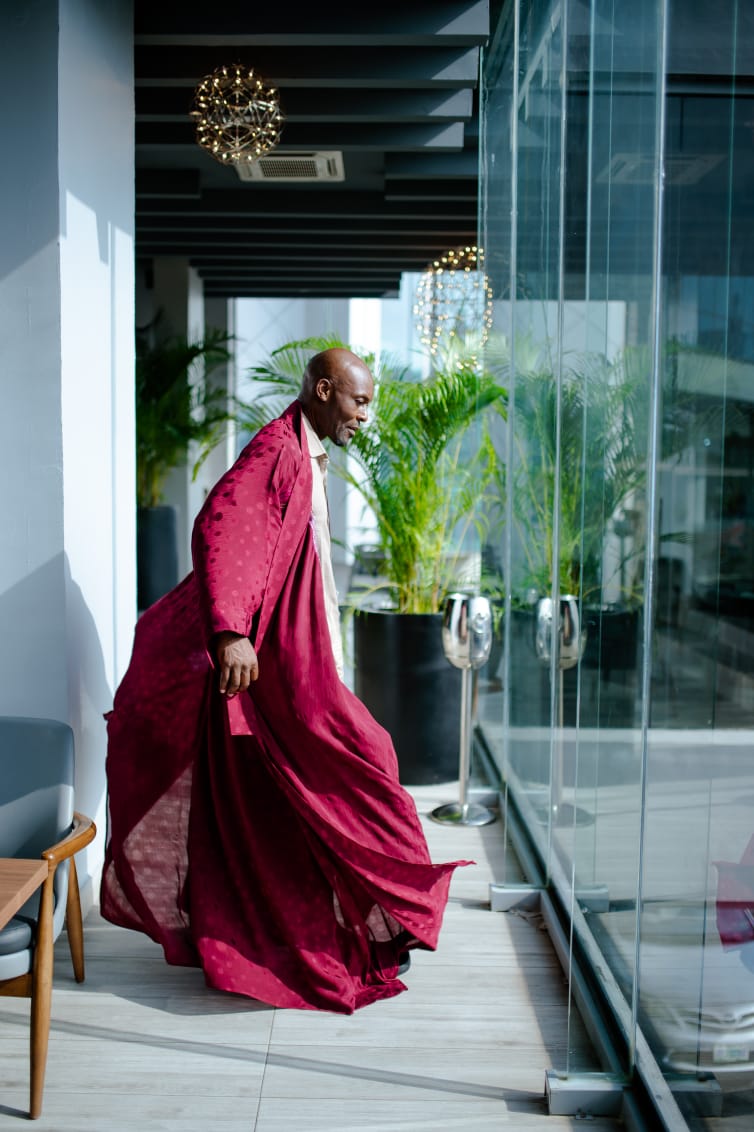 How important is The African International Film Festival (AFRIFF) in showcasing and promoting African talent and stories to a global audience?
How important is The African International Film Festival (AFRIFF) in showcasing and promoting African talent and stories to a global audience?
It’s absolutely necessary to have these type of festivals, even though it is fairly new, about 12 years old. You can see how quickly it has grown, and the potential of the industry market is amazing. To be able to showcase content and movies coming from the continent to the rest of the world is what we need to do if we want to preserve our identity, culture, traditions, and stories. We should have a lot more film festivals at different levels. It is like everywhere else; if you are in the US, pretty much every week there is a big film festival happening, the New York Film Festival, etc. AFRIFF should lead the pack but it won’t restrict other film festivals whether in Nigeria or other African countries.
Is this your first time attending AFRIFF?
No. I won an AFRIFF award for the movie, Rattlesnakes. If you enjoyed Everything But A Man, then you should watch this.
Can you tell us a little bit more about your experience working on the movie, Rise, that led to your AMAA win; what was unique or challenging about your role in that particular project?
Talking about taking risks with roles, I knew that I would be challenged playing the head of the Boko Haram, but at the same time, I accepted the challenge. We had a consultant with us, one of the girls, Joy, who was kidnapped. She was on set with us – just to be able to go through the daily routine of what some of the girls went through. It’s quite unbelievable. And even for myself to understand the reasons behind what my character was doing, because you know he had his reasons; yes, sometimes the reasons would not be aligned with someone else’s belief system but, you know, he had his reasons. So, that was challenging because, obviously, it’s very different from who I am as a person, the belief system and everything. But that’s the character of the guy in the play; he is ruthless. That was very challenging. But at the end of the day, I was prepared to take on that challenge.
So here you are, Haitian-American, playing the role of a Nigerian ruthless, gang leader; what emotion played out the most for you? This is now cross-cultures, cross-boundaries, cross-industries; a lot of crosses.
The good thing is that I have crossed boundaries a lot in the past with some of my other roles. You know, I’ve played Nigerian characters in so many movies, and the first one was probably Tears of the Sun, with Bruce Willis, and that was back in 2001. And after that, some of you might remember Tunde Jonathan in Phat Girlz done with Mo’Nique.
I’ve played some different characters and I wasn’t scared of that because I understood enough of the culture of the people to take that on. I think the scariest thing about this one (Boko Haram story) is the fact that it is an ongoing situation, you know what I mean? And me coming to embody the head of Boko Haram was the most challenging part about it for me because it is ongoing.
Thank you for sharing that deep insight. We have Stephen Love as the head of the jury for AFRIFF this year and this is a Hollywood producer and moviemaker; what are your thoughts about that as an impact on African cinema and the collaboration between the two worlds?
I have always believed in collaboration. We need to bridge the gap and that’s one of the ways – by bringing professionals from over there to mix with professionals here, and from that we can see what kind of ideas emerge. To have someone of that level coming here, I think it is important because having him on the panel and having his thoughts heard will hopefully increase knowledge when applied, and vice-versa. Don’t get me wrong, some of the people who come over here also go back with something. They don’t just come and leave, they go back with something. It is really an exchange. Sometimes they go back home with more and I think it is important to understand the landscape over there as well, and so when you have professionals who agree to make the move to come here; because it is not easy to convince people from the States to come to Africa in general, and particularly Nigeria, because the perception of Nigeria out there is not the best and this is an area we should work on a bit – service, tourism, embassy and its approach and relationship with foreigners. That’s very important. It can be very scary for anyone to want to come here because they are stuck making calls and then they decide they don’t want to come to Nigeria because it is too rough.
I understand there is a lot of cultural identity attached to some of the behaviours. I get that and nobody wants to change anybody because we have to stay close to our culture. That’s fine. But in some areas, we have to be able to open up a little bit and be more welcoming, and by doing that we can have a bit more cooperation moving forward.
I love how understanding you are about our behaviour. You have been coming to Nigeria for almost two decades. So, what is your love relationship with Nigeria?
At the end of the day, to be completely honest, I’m a black man living outside of my continent. Everything you do when you’re outside of your continent, you adapt to a lifestyle that is not yours, to a language, to food, to music, everything pretty much. But sometimes you might not have intended to adapt so much, but it becomes normal.
But earlier on in my life, I knew it wasn’t normal. So that’s why I always tried to come back to my roots. First of all, Haiti for sure, but really it’s Africa, the roots are in Africa because even being in Haiti I was thrown out there without my will, without my ancestors’ will. To be able to understand who you are, you have to understand your roots. You have to go back to your place, otherwise, who are you? You know what I mean? So that has been very important to me. So that’s why I always try to have a relationship with Africa, not just Nigeria.
I go to many places in Africa: South Africa, Ivory Coast, Senegal, Burkina Faso, and Ghana, you name it. But Nigeria is obviously the leader of the pack.
Nigeria has shone in so many ways and should be the leader of the pack. And as far as the film industry is concerned, it’s also the same situation. When the Nollywood movement, even though it was very young, nobody thought that it would be where it is now in such a short period of time.
You know, people are just used to dissing Nollywood movies. I mean, you have no idea! They would be like; “what is this”. They would diss, diss, diss, and you know Nigerians would just keep working and working, working and things got better and better and better, and now people are watching.
Yes, they are watching and listening
Now people are coming back, professionals are coming back and the level of the quality of the movies is stepping up. And you know what: in five, ten years, there’s going to be all kinds of competitions internationally. So I think we’re here because of a couple of things. Number one is, the population of Nigerians is huge and when each Nigerian has access to this thing here (points to a phone), that means each Nigerian has access to content and that equals money. At this point it’s all about math, those guys out there are ‘counting money’, they are looking at the potential and the potential is here. If you have people sniffing around, it’s not because they like the country; it is because they can make money out of the country. So we have to understand that.
We have to tap into that. Understand, protect, and project.
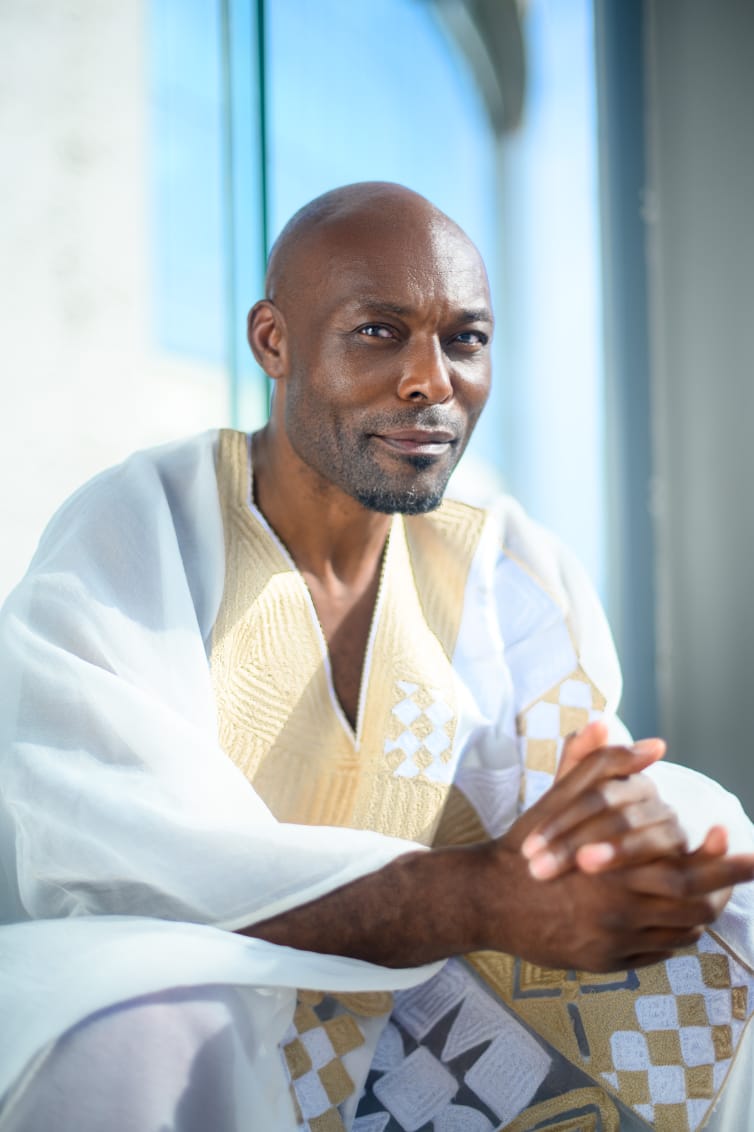
Now let’s talk BROmance.
Bromance? Yes. With whom?
Kunle Afolayan.
You are working on another film with him?
Yeah.
This would be about your third film. Why Kunle?
As I said before, I don’t choose things; I go with my gut feelings. We met a long time ago in 2007, and at that time Kunle had shot one movie and that’s when we became friends. We used to see each other in multiple places, from L.A. to Cannes to Egypt. I mean, all kind of places, and we would hang out together and have a good time. We knew that at some point some projects will connect us, and then it slowly started to make sense. I flew here for his movie for just two or three days. I formally shot for a couple of days and then went back and that was it; that was for CEO. And then we collaborated on Citation, which was obviously a very good movie, a good subject matter with beautiful Temi who was doing her first movie, and she did an excellent job and now we are working on a third movie because, once again, you want to work with and support your friends. You understand what your friends are bringing. And I think at a professional level we understand who’s bringing what as well. So it’s just something that makes sense. So it’s not just Kunle. Okay? So if there are good stories out there and good directors who would like to collaborate with me, I’m more than happy to do so.
I did collaborate with a few other people; it’s just that I’ve done more things with Kunle. But you know, there are some other people that I’m constantly talking with and it’s just a matter of time.
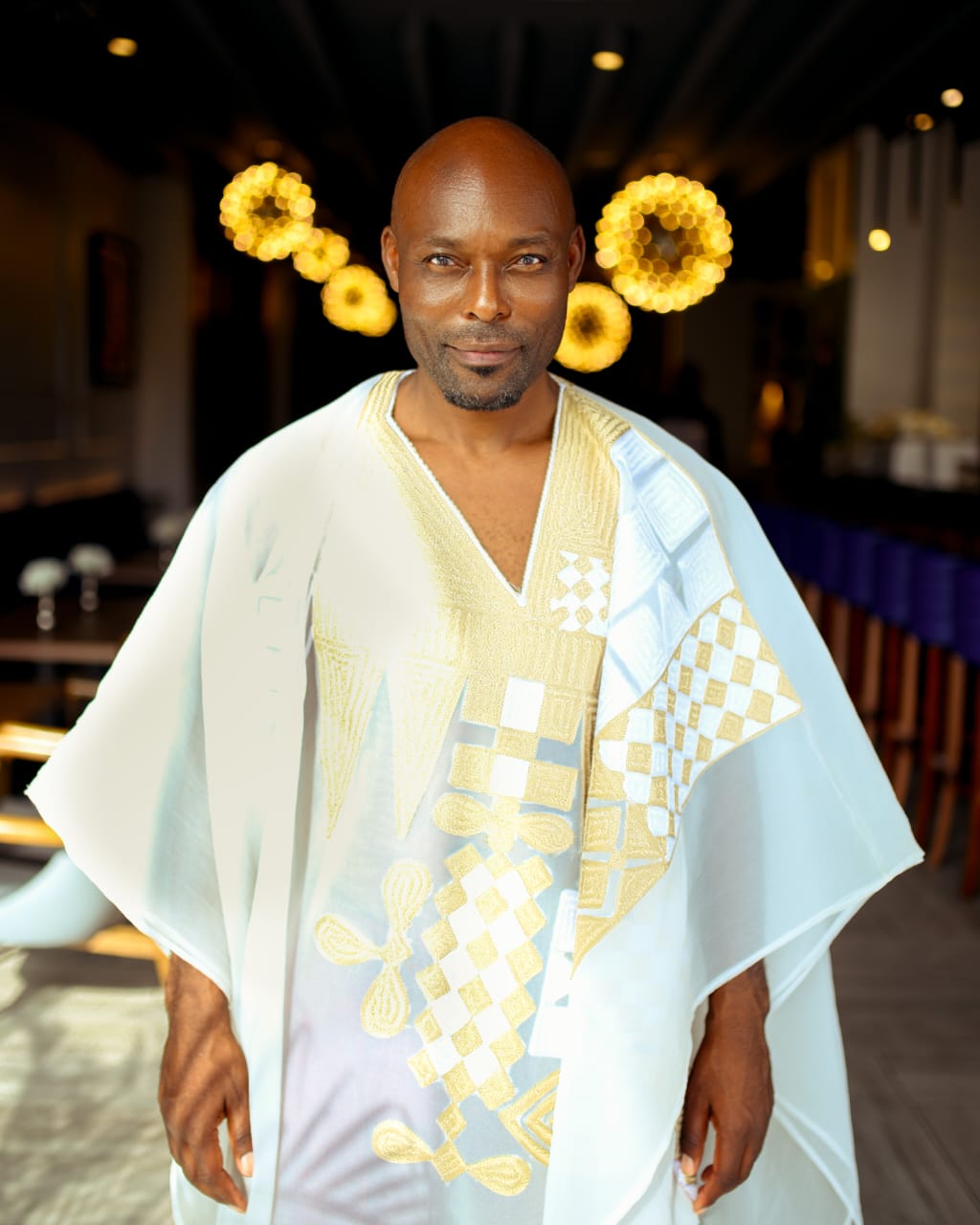
Okay, so can you tell me what your future projects look like; are there upcoming roles or films you’re particularly excited about apart from your supernatural thriller?
Yeah, yeah. That one, the name is there, but nobody knows. I can’t tell you.
Please tell me. Could you give me an exclusive?
It’s hush-hush, I can’t tell you. I do have many movies coming out; things that I’ve already shot. But once again, with me, I shoot in multiple continents throughout the year, because my model has been, at least for the past 15 years, to shoot one movie per continent, and I’ve sort of been able to do that.
Have you shot in Asia?
Yes, but you are not Asian, so you haven’t seen that. I knew in my mind with that concept that people would connect the dots. But I don’t mind if people don’t realise that I am doing things here, in South America, and in Asia. It’s okay. But at one point all those things will be connected.
You are very deliberate and intentional.
You have to be intentional. You know, it’s a short life, it’s a short career. So, you have to be intentional with everything you say and everything you do.
So, what’s your worst Nigerian experience?
I don’t know. I forget the bad things because I don’t concentrate on the bad things. You know what I mean? You learn from it and move on, so I wouldn’t be able to have a proper answer for that.

